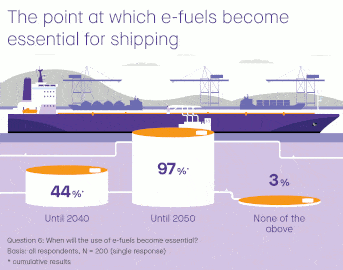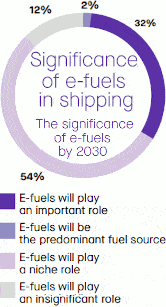
Synthetic fuels are essential for decarbonisation
maritime transport. This is evidenced by the results of a survey
conducted by the market research company Mo'Web for
Accelleron from Switzerland, interviewing 200 managers of the
sector. Around 93% of these believe that e-fuels, i.e.
Synthetic fuels with the potential to be climate neutral
made using electricity produced from
renewable energy sources, make a decisive contribution to a more sustainable
tenable. A similar proportion (92%) believe that e-fuels
can make a significant contribution to reducing the
global CO2 emissions from shipping, far exceeding
alternatives including biofuels (69%), natural gas
liquefied (60%), fossil-derived hydrogen (52%) and
fossil fuels combined with systems for capturing the
carbon (32%).
The research specifies that from the survey conducted among executives of
from Germany, the Netherlands, Belgium and Spain is
found that the largest group of respondents (44%)
expects that the availability of e-fuels will continue to
be limited until 2030, although almost everyone is hopeful
whereas supply issues will be addressed by
2050. To improve the availability of fuels
synthetics, more than half (58%) of respondents
calls for government incentives and subsidies for the production of
e-fuel. This is also in view of the cost of e-fuels,
whereas three-quarters of respondents believe that they will remain in the
12 years higher than that of the
fossil fuels and do not expect that the parity of
can be reached before 2040. Four companies of
In addition, the regulatory framework for the
insufficient and a lack of political support for the introduction of the
synthetic fuels.
 Another aspect taken into account for the introduction in the
the maritime transport sector of synthetic fuels is
that of the problems of their use to power ship engines:
The survey, in fact, shows that their implementation is
considered technically complex by the vast majority
of companies (82%), even though those with a higher annual turnover
are less concerned. Among the most important obstacles
frequently cited for the introduction of e-fuels, in addition to the
lack of availability (46%), there are high
change costs for their use (50%) and problems
infrastructure for their distribution (43%).
Another aspect taken into account for the introduction in the
the maritime transport sector of synthetic fuels is
that of the problems of their use to power ship engines:
The survey, in fact, shows that their implementation is
considered technically complex by the vast majority
of companies (82%), even though those with a higher annual turnover
are less concerned. Among the most important obstacles
frequently cited for the introduction of e-fuels, in addition to the
lack of availability (46%), there are high
change costs for their use (50%) and problems
infrastructure for their distribution (43%).
Nevertheless, two-thirds of companies currently believe that
that the use of synthetic fuels is an advantage
and almost half of the respondents have already
concrete plans to invest in their use. For the majority
(60%), the adaptation of existing ships to operate
with e-fuel is considered the best medium-sized strategy
deadline for decarbonisation, and 36% are already
planning the technical adaptation of its vessels.
 To prepare for the use of synthetic fuels,
Navigation currently rely more frequently (47%)
to in-house training. In addition, 41% are looking for
strategic partnerships with e-fuel suppliers, while 36% are
planning a technical modernisation of their vessels. In addition
due to the target set by the International Maritime
Organization for the decarbonisation of maritime transport by
2050 and the high impact of synthetic fuels in the
three-quarters of the companies achieving this goal
interviewees expect that they will no longer be able to do without
e-fuel by 2045 at the latest.
To prepare for the use of synthetic fuels,
Navigation currently rely more frequently (47%)
to in-house training. In addition, 41% are looking for
strategic partnerships with e-fuel suppliers, while 36% are
planning a technical modernisation of their vessels. In addition
due to the target set by the International Maritime
Organization for the decarbonisation of maritime transport by
2050 and the high impact of synthetic fuels in the
three-quarters of the companies achieving this goal
interviewees expect that they will no longer be able to do without
e-fuel by 2045 at the latest.
noting that the survey highlights the great potential of
e-fuels for the decarbonisation of maritime transport,
Accelleron's managing director, Daniel Bischofberger,
noted that 'the overall focus of the sector is between the
Lawmakers must now move quickly towards construction
of the right infrastructure for better availability and
towards the right state incentives to achieve equality
of the long-term costs between fossil fuels and fossil fuels.
synthetics'.